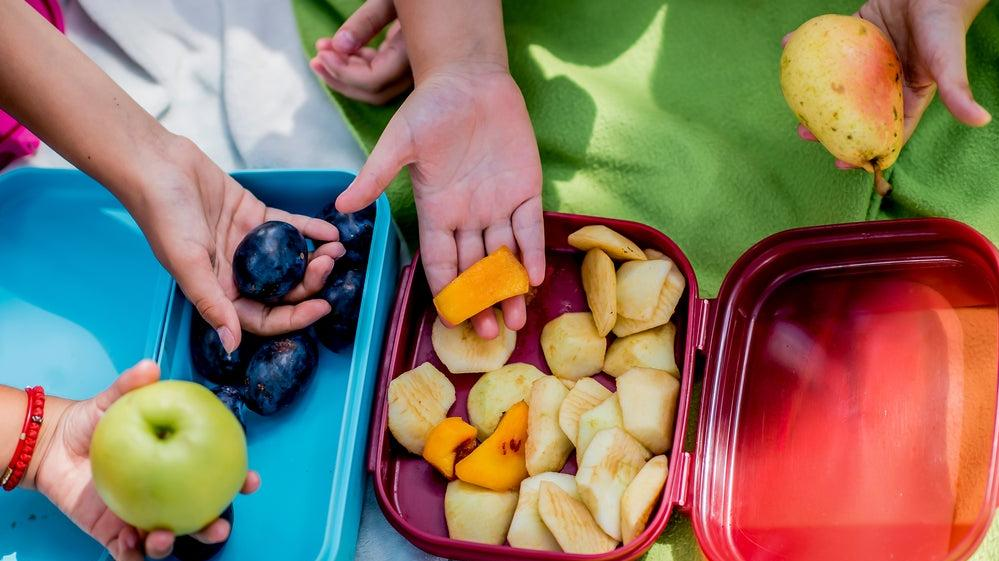Should Parents Be Expected To Bring Snacks For The Class?
The trials and tribulations of classroom snack time.
In my former profession, I was a teacher, so let me start this by saying I will never make it my business to tell teachers they need to do something more than what they already do every day. This complaint is not about them. It's about the policy of the school, the greater school district, or possibly someone even higher up the ladder—whoever can be blamed for the current "snack time" infrastructure in early elementary classrooms. Please, as a parent, I don't want snack time duty. Please relieve me of my post.
How snack time works at our school (and why I hate it)
In the fall, parents sign up for a few weeks throughout the school year to be in charge of snacks. We are given a list of allergies, which can be as simple as "no nuts" but might be as extensive as "no nuts, no dairy AT ALL, no sesame." You'd be surprised how many products contain dairy; even some graham crackers have it. As a result, it's hard to find a variety of products that satisfy the requirements.
In previous years, I've stuck with fruit. The problem with fruit, besides the fact that tiny oranges create conflict and little fingers can't always peel what needs peeling, is that early elementary students are constantly losing teeth, so they can't always bite into fruit like apples unless they're sliced. Still, apples and oranges often won out, because I had to bring the snack on Monday and it had to last for the whole week; cut-up fruit or softer stuff like grapes and strawberries would have gone bad.
I'm a fairly responsible human who only works part time, and even so, it was hard to remember to bring the classroom snacks. Parents forgot all the time, leaving the teacher to scramble and cover with leftovers from the week before. Plus, we were all getting COVID exposures left and right and not being able to fulfill our duties. Also, my child hated the snack options pretty much always and refused to eat them, leaving her snackless and hangry. The system doesn't work!
How snack time works elsewhere
We're at a public school in Oregon. Some public school kids in Oregon bring their own snack while other districts have a similar system to ours; there's no mandated policy across the school system. I polled parents from around the country to see what others are responsible for when it comes to snack time.
A lot of schools, either because of COVID or convenience, have kids bring their own personal snack every day. I was surprised by the number of private schools that required kids to bring their own snacks. What are you paying for if not the convenience of not having to feed your children?
Some schools make the choice to provide snacks. One parent with kids in New York City public school told me the school supplies all the food, including snacks. I found a strict "snack policy" for NYC schools, but I'm not sure how closely they follow it.
On the other end of the spectrum, the parent of a child at a Waldorf school said the teacher makes "a big pot of something" like quinoa, oatmeal, or bread baked in class, shared among the students; this is often paired with apple slices, they said, and parents provide the apples. My child would not go for that, but way to go, Waldorf kids! Eat that communal oatmeal!
Of course, when parents are the ones to provide snacks, things can get competitive. At a public charter school in the Bay Area, one mom said it felt like she had to provide the healthiest, most delicious snack that was also the prettiest and was also homemade, or else she and her kid faced ostracization. As someone who grew up in a wealthy Bay Area suburb, I am not surprised.
Parents in other countries, meanwhile, had some variety in their practices as well. However, the overall trend seems to be that there's more of a focus on fruit, and much of that fruit is provided and prepared by the school. Sigh, America.
Some schools don't allow snacks at all, encouraging kids to get all their nutrients from meals. Good luck with that.
The best way for schools to approach snack time
The best snack time approach I heard about is a hybrid model (everything works best as a hybrid model these days). Kids bring their own snack daily, but parents who are able will periodically donate some extra, shelf-stable snacks for the teacher to have on hand in case kids forget or are unable to bring their own. Parents reported this in both Title 1 districts and school districts that did not have high levels of poverty.
I looked at what is available to kids who are receiving free and reduced-price food services and what is required according to the public programs that provide food for children at school. There are a lot of rules depending on the setup of the school, but basically the USDA National lunch and breakfast programs do not require snacks. They do need to include certain food groups in breakfast and lunch, and since most kids who receive these services are having at least lunch while at school, the guidelines require that up to a third of a child's daily calories be met by school lunch. If a school or district doesn't have a snack policy like NYC's, it's up to the individual classrooms to work it out for themselves.
If your school expects you to whip up homemade batches of sesame-free, gluten-free, soy-free snacks every month, maybe there's a way to help change the policy in your classroom or school. But in doing so, understand that you may be shunned by the other, better moms. I'm kidding. I hope.
